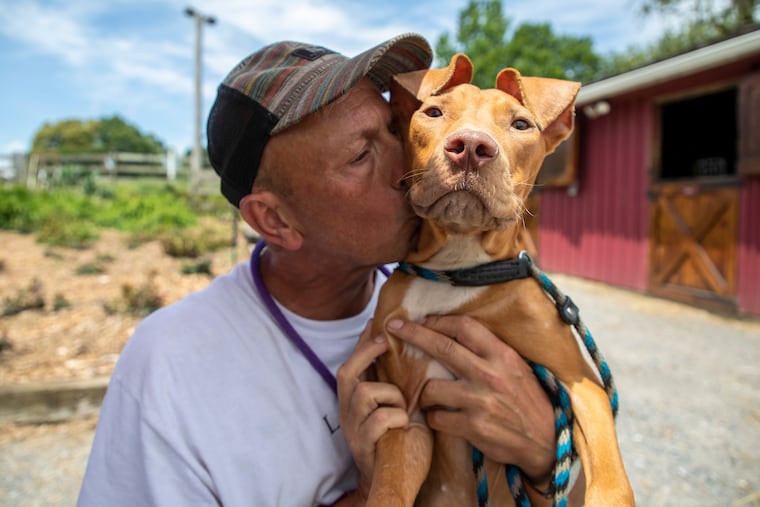Chester County animal sanctuary is home to horses, dogs, cats, goats, cows, and the occasional emu
Most of the animals that arrive at LaMancha come with a less-than-rosy life experience. But things are different here.

In southern Chester County, just off Route 82, a serene, bucolic setting comes into view: a 45-acre animal sanctuary that is home to horses, dogs, cats, goats, cows and the occasional emu.
Ducks, too, and plump chickens that hop onto pot-bellied pigs basking in the shade. Horses peer out from their stables, sequestered from sunny pastures until the cooler evening. Pups that want to cool off in the summer heat can splash in the pond or settle into a rowboat for a ride.
Welcome to LaMancha Animal Rescue, a refuge for creatures from as far away as Alaska and as near as Philadelphia. All find shelter at this welcoming rural haven in Unionville, which takes in scores of dogs and cats, along with aging race horses saved from certain slaughter and unconventional animals such as peacocks unlikely to find space in public shelters.
The work is never-ending, said Dru Campbell, who started LaMancha with her husband, Tom Quinn, in 2001.
“It’s what the world of rescue is all about,” she said. “No matter how many animals we save, there’s always another one.”
In 2005, the couple registered the rescue as a nonprofit. The organization relies largely on adoption fees and donations to fund its work. In addition to scores of animals that make the place their home, more than 600 dogs from LaMancha are adopted each year. In just the first six months of this year, the shelter has sent 301 dogs, 28 cats, a pig, a goat, and two horses to permanent homes.
Campbell and her husband originally had visions of rescuing ex-racehorses and Karelian bear dogs, known for their ability to hunt moose, bears, and wild boars. Then the couple started bringing home all sorts of stray dogs and cats. That grew into taking in chickens that were abandoned once they no longer laid eggs; emus surrendered by a school once it realized the ostrich-like birds were, in fact, too big to keep anywhere on campus; the occasional goat.
Over the years, the rescue became known as a go-to for adopting Great Pyrenees, the massive, fluffy working dogs often kept on farms to protect livestock.
“If they’re no good at being a flock dog, they dump them,” said Geoff Player, a longtime volunteer at LaMancha. “And if they’re not spayed or neutered, there are litters roaming the streets.”
Five years ago, Campbell retired from her corporate job in robotics and artificial intelligence and turned her full attention to rescuing animals, some from as far away as Canada, Kentucky, and Ohio. Her husband, meanwhile, continues to work as a business manager for an artwork company.
“There’s only 24 hours in the day," she said, “so you have to choose where you spend the most time.”
These days, Campbell said, a dedicated team of 100 volunteers shows up in their free time to tend to the animals and help folks looking to adopt find their ideal pet. On any given day, 14 to 16 volunteers are working at the rescue, jetting from the air-conditioned dog kennels to the climate-controlled “cat condo,” where felines laze about in fleece-lined beds, blinking serenely at the guests who enter their home.
Player, 58, a former longtime information-technology employee at Mars Inc., is among the most committed volunteers.
“I love being here,” he said. “We treat these animals as if they were our own.”
Many of the volunteers, Campbell said, have adopted animals from LaMancha, or had family and friends bring home a pet from the shelter. Player is among them.
On a recent day, he strode around the farm, then peered in at the 59 dogs in kennels, some of which volunteers had paired so they could keep each other company. He clucked his tongue and cooed at the animals. Recalled, with no hesitation, several of their backstories.
More dogs than usual had come from the Animal Care and Control Team of Philadelphia, he said, amid a widespread upper-respiratory infection outbreak at its Hunting Park facility that prompted a (now-lifted) two-week cancellation of adoptions.
Then there were brighter tales.
“This is Champ,” he said, as the resident pitbull mix with the scarred snout came bounding up to him, tail wagging. “He came to us two, three years ago. He’s an ex-fighting dog. We are big believers that ex-fighting dogs can be rehabilitated. He sleeps on the bed with another ex-fighting dog.”
Over the next hour, he cuddled with another dog, checked on the cats in their small house (“I’m allergic,” he said, just before he entered), and corralled a trio of horses that crowded about him in a dusty pen.
He gestured grandly at the pristine farmland before him.
“Are we lucky or what?” he said.